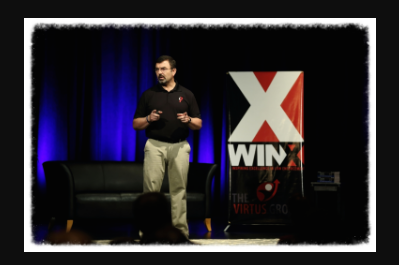There’s a lot of discussion these days about the need to develop, grow and maintain relationships with “The Community.” By community we usually refer to the people who live and work in the cities, towns, villages and counties where we police. Within each city, town and county there are a number of diverse communities. These are the people we have sworn to serve and protect and we need to have strong, positive relationships with these communities—all of them.
Strong relationships are built on the foundation of unconditional respect, where we see others as people who have hopes, dreams, fears and aspirations, which may be different from ours but nonetheless worthwhile. Seeing others as people and embracing the concept of unconditional respects builds trust as well as a culture of mutual respect, allowing for enhanced safety for both citizens and law enforcement professionals.

WINx: Inspiring Excellence in Law Enforcement was created as a venue to challenge and inspire law enforcement professionals to think, train, lead, prepare, behave and live differently. Are you up to the challenge? REGISTER NOW!
Jack Colwell and Chip Huth call this The Power of Unconditional Respect.
Procedural Justice is a philosophy weaving its way through the law enforcement profession as a way to build and enhance those relationships. While the wording varies slightly depending on the source, the four pillars or cornerstones of Procedural Justice are:
- Treating people with dignity and respect.
- Giving people a ‘voice.’
- Neutrality in decision-making.
- Creating a sense of trustworthiness.
The pillars of Procedural Justice and the Power of Unconditional Respect are critical to building strong relationships with our communities. The problem is that many agencies are completely focused outward when it comes to ‘community’ and so doing neglect the most basic element: see ourselves in community, specifically the police agency.
It’s unrealistic to expect officers to have unconditional respect for members of the public if that philosophy isn’t part of the culture of the agency itself. Officers, deputies, constables and troopers who are not treated with dignity and respect by their supervisors, who are not given a voice in decisions and strategies utilized to implement ‘community policing,’ who feel there is no neutrality in the decision-making process in their agency, and who don’t trust their leaders and whose leaders do not trust them to do their jobs—they will struggle to embrace those same concepts when dealing with the public.
The first community you need to build relationships with is your own agency. When you have a culture of leadership, trust, dignity, respect, and inclusion people will naturally model those behaviors when dealing with others. In his must-read book Leadership Lessons from a UPS Driver: Delivering a Culture of We, Not Me, Ron Wallace (police officer, entrepreneur and retired President of International Operations for UPS) says the following about culture:
“To be truly effective, a company’s culture has to dwell in the hearts and minds of the people charged with delivering its mission. They have to live and breathe their culture every day. It can’t be reduced to some slogans plastered on a wall or a mission statement mounted in a nice picture frame. Rather, it must embody the soul of teamwork. It is up to the leaders to not only talk with their team members about those principles but also to live by them. To sustain a unique culture, all the components need to be present in the right proportions.”
When leaders create a culture of giving people a voice by asking the frontline personnel for their input and ideas—and implementing those ideas—those officers feel valued and are more invested in the decisions and outcomes. When agencies hire talent, not just bodies, and leaders train their people and then trust their people to do their jobs, they will usually be rewarded with high levels of performance.
In his book Team of Teams, General Stanley Chrystal (U.S. Army, Ret.) says that when they entrusted their people and pushed decision-making down to the lowest levels not only did the speed of decisions increase, so did the quality of those decisions. He talks about the psychology of decision-making and says, “An individual who makes a decision, becomes more invested in its outcome.”
Conclusion
The men and women coming into the law enforcement profession want to be part of something bigger than themselves. They want to be part of the solution. They have grown up with a broad sense of community and inclusion. They want to be great at their profession. They want to serve.
It is time to think, lead, train, live and behave differently. A good place to start is by thinking differently about what community means and realizing that community, like charity, starts at home.










0 Comments